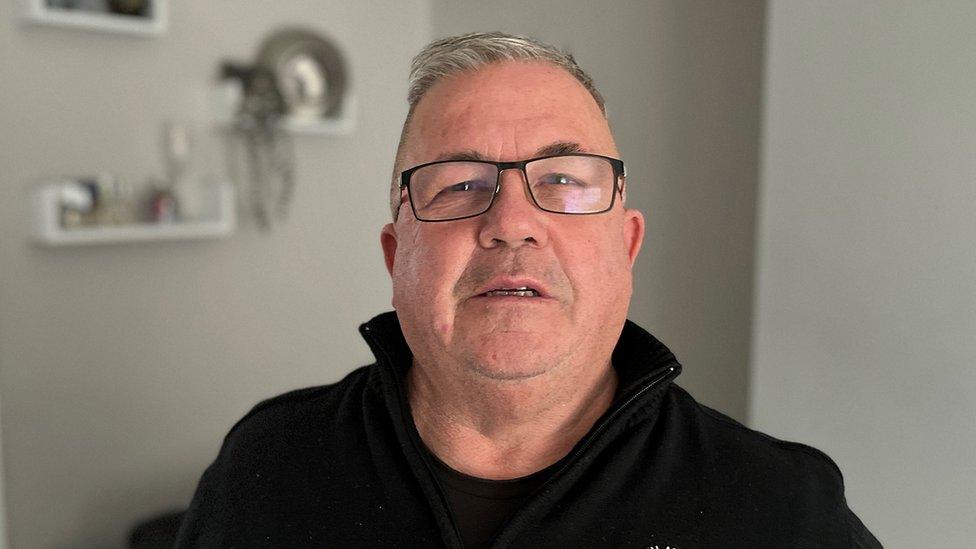KC’s ferries report: What questions remain?
- Published
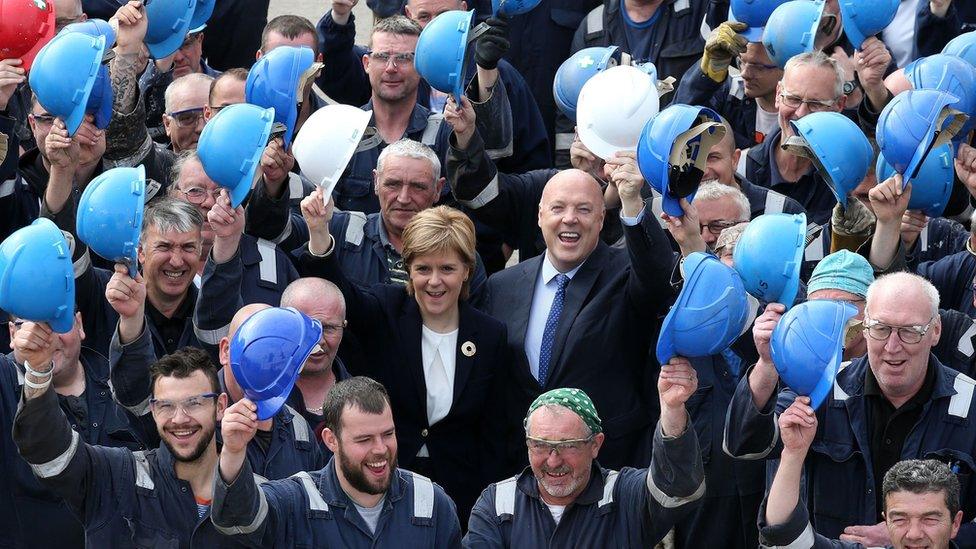
Nicola Sturgeon and Jim McColl on the day FMEL was announced as preferred bidder
The construction of two CalMac ferries at the Ferguson shipyard in Port Glasgow has become one of the worst public procurement disasters of the devolution era.
Six years late, massively overbudget and still not completed, it has blown the ferry renewal programme off course and left island communities at the mercy of an increasingly unreliable fleet.
Initially seen as a huge boost for the shipyard, the order has been a disaster, leaving the workforce embarrassed by events beyond their control and a proud 120-year reputation tarnished.
Two parliamentary inquiries and an Audit Scotland investigation have tried to get to the bottom of what's gone wrong.
A year ago a BBC Disclosure documentary, The Great Ferries Scandal, presented new evidence gleaned from hundreds of leaked documents that suggested the procurement may have been rigged.
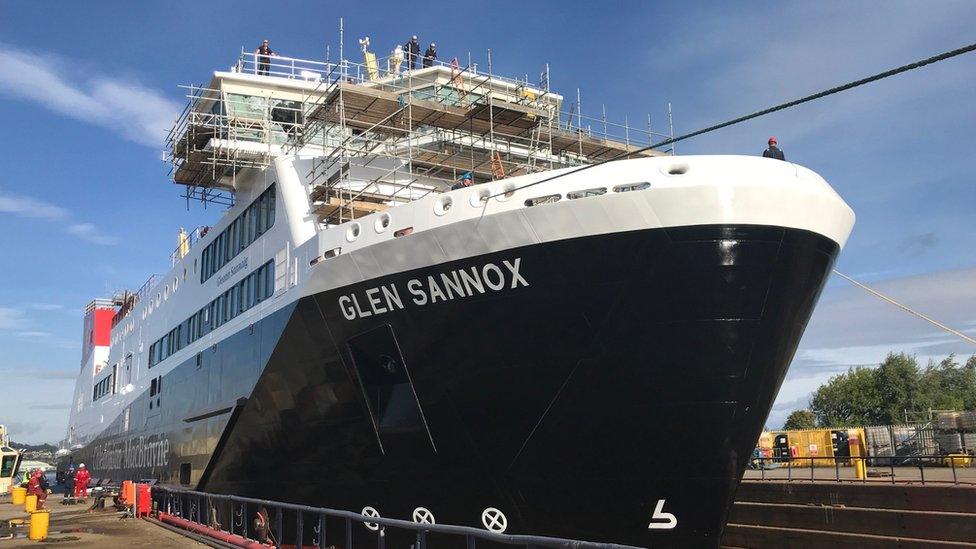
The Glen Sannox is one of two delayed and overbudget dual-fuel vessels.
The bid by FMEL, a new company led by businessman Jim McColl, was the most expensive.
But it beat off competition from some of Europe's leading shipyards with a design, according to ferries government-owned procurement agency CMAL, that was more detailed and developed than the rest.
The design of these vessels is at the centre of many of the delays and cost overruns that have followed.
CMAL responded to the BBC documentary by appointing a lawyer to conduct an investigation into whether the allegations amounted to fraud.
The BBC had not published allegations of fraud.
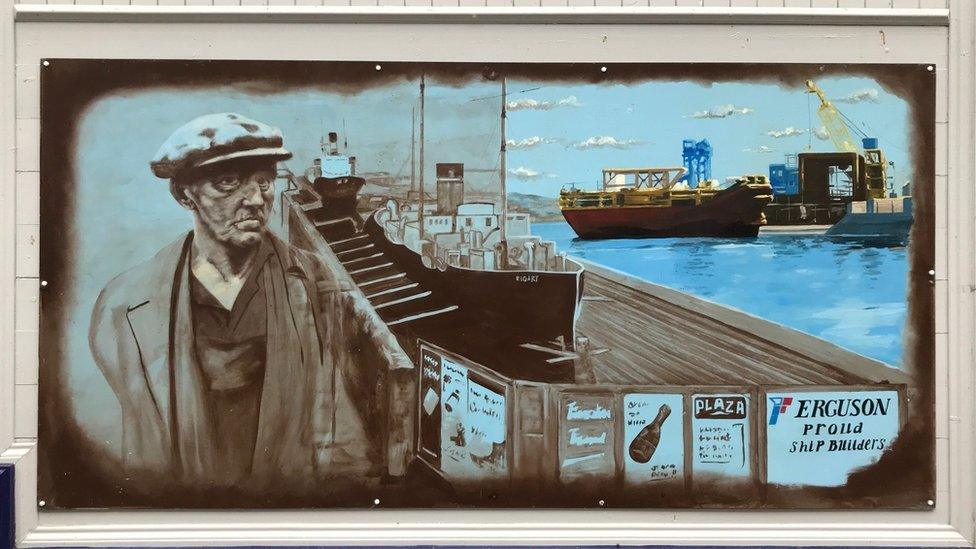
A mural in Port Glasgow recalls the pride that was once felt by Ferguson Shipbuilders
Barry Smith KC's 40-page report, external, published last month, found no evidence that fraud was committed, while adding this was "not the same as saying that the procurement process was conducted perfectly".
However, some questions remain.
CMAL's former procurement manager George McGregor - whose job it was to ensure the process was conducted fairly - has come forward, saying he gave evidence to Mr Smith's inquiry that he raised serious concerns at the time.
And BBC Disclosure can report that the leaked dossier contains evidence which has either not been made available to Mr Smith, or does not feature in his report.

WHAT DID THE BBC DOCUMENTARY SAY?
FMEL was allowed to pass through the qualifying stage of the tender, despite being the only shipyard unable to supply a letter from a bank to prove they could provide a refund guarantee, which was a mandatory requirement.
This relates to question 44 in the Pre Qualifying Questionnaire (PQQ).
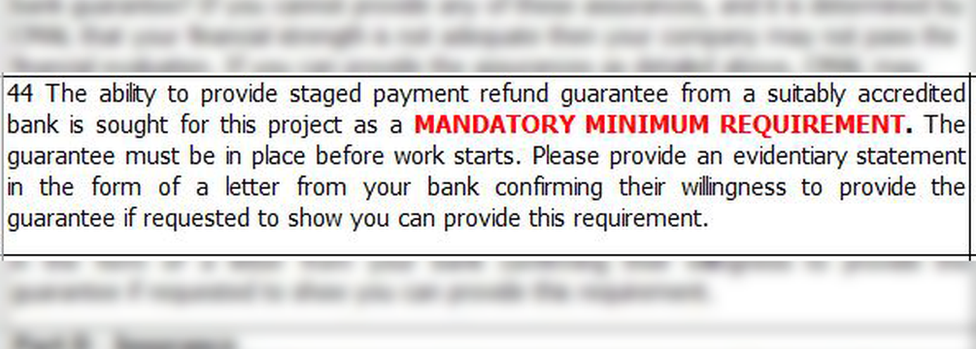
Barry Smith's investigation found that both the BBC and the Auditor General had misunderstood the "poorly-worded" questionnaire sent out by CMAL to prospective bidders.
He concludes that while refund guarantees were a "minimum mandatory requirement" to be in place before the work started, there was no mandatory requirement to provide a letter at this stage as evidence of a firm's ability to provide these financial safeguards.
The BBC has seen previously unpublished evidence that suggests providing the bank letter was always intended to be mandatory.
In an email discussion between CMAL executives and a lawyer on 23/24 September 2014, the lawyer began:
"when you are launching tenders for new vessels, it occurs to me that it would be sensible for you to require written confirmation from each tenderer's bank that it will provide a refund guarantee in the required form as part of your tender process.
"If you impose this requirement when you go out to the market, and either score it or make it pass/fail, it will be very difficult for a yard to be appointed as preferred tenderer and then say that they can't provide one."
The procurement manager replied that she was satisfied the proposed wording of Q44 already did this, and added:
"We would expect to reject any PQQ responder unable to provide the letter"
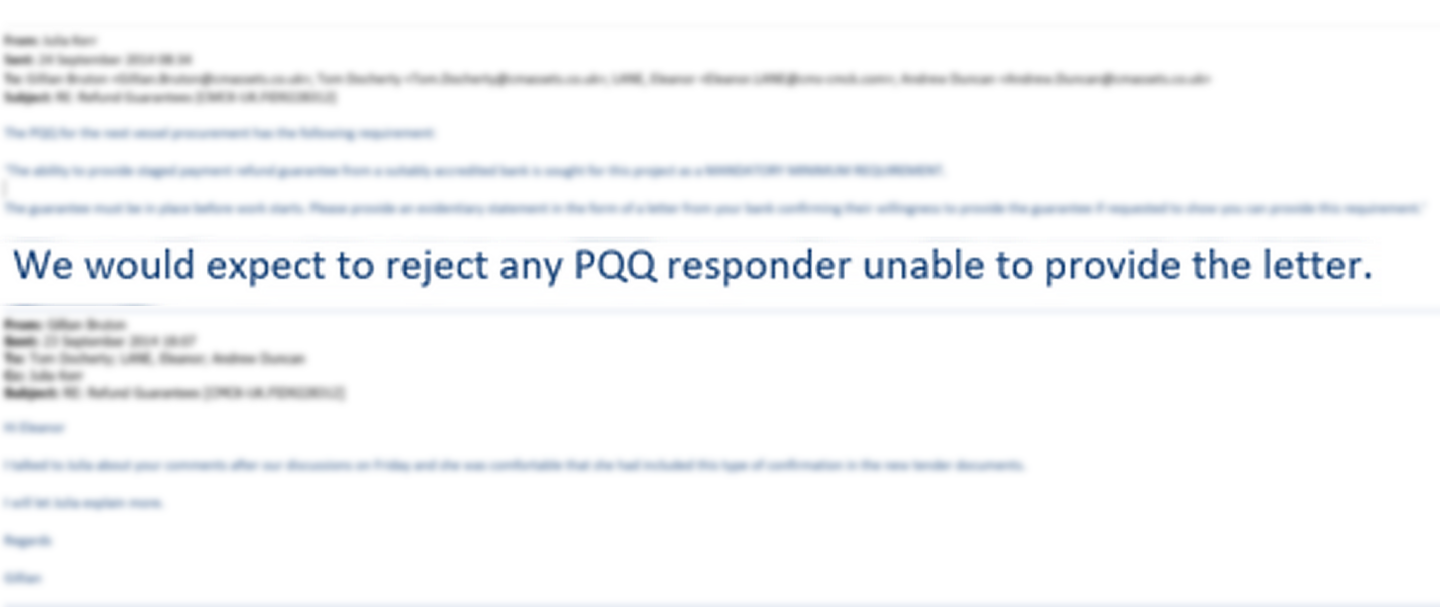
The formal contract notice was published three weeks later and is still available to view online. , external
Under Conditions for Participation it states: All candidates will be required to provide a reference from their bank
These points were not reflected in Mr Smith's report. He did not address specific questions from the BBC over whether he had been provided with this information.
In a statement he said: "If the BBC believe there is new information that I have not seen, then please share all relevant information with me and I will carefully consider it."

FMEL had exclusive access to a key document, CalMac's Specification of Operational and Technical Requirements (SOTR), which gave it an unfair advantage over other bidders.
This was a 424-page document produced by CalMac setting out its needs for the ferries. It was given to CMAL, who then used a design firm to distil this into a 130-page document which was sent to all the bidders.
The BBC discovered that FMEL had exclusively obtained the longer original document, and used it as the basis for its own technical schedule. About 90% of it was cut and pasted.
Ferguson copied a large section of its bid from a CalMac document
Did that help FMEL? The KC's investigation concluded that all the "critical information" from the SOTR was also contained in the shorter document made available to all bidders and FMEL gained no advantage.
Internal CMAL documents seen by the BBC suggest FMEL did gain a significant advantage, and that other bidders were marked down for failing to expand on the shorter document.
On its technical specification submission, which carried 10% of the total score, the FMEL design scored the highest, with 8.5 (out of 10).
After FMEL was announced as preferred bidder, the second placed yard - Poland's Remontowa - wrote a letter querying its low scores (it scored four out of 10 for this section).
CMAL's vessels director wrote back: "The LMG [Remontowa] technical specification was evaluated as poor. The LMG submission was with the exception of a few items identical to the tender technical specification. The LMG submission did not expand in any great detail from the buyer's tender technical specification."
He went on to explain that FMEL's technical document - the one that was almost entirely copied from CalMac's SOTR - scored higher because it was longer and had more detail.
"The winning submission was a fuller developed technical specification containing 351 pages with full details of the scope of supply included," he wrote
This document had been referenced in the BBC documentary. Mr Smith's report makes no mention of this exchange.

FMEL was allowed to materially alter its design almost two months after the deadline for submissions, swapping its original Model 20 design for a lighter ship, known as Model 10. As a consequence it was able to reduce its tender price by almost £10m.
The KC's report accepts that FMEL was allowed to revise its bid. He says this was bound to have had "some effect" on the evaluation of the bids but cannot say that it changed the outcome.
He found no evidence of fraudulent intent and said the evaluation by the CMAL team was done "professionally and properly".
The BBC has seen evidence, apparently not supplied to Mr Smith, that suggests this change of design, in effect, won FMEL the contract.
Mr Smith accepts assurances from a CMAL official who was involved at the time that they genuinely believed two design variants were being offered in FMEL's original bid submitted by the 31 March deadline.
Documents seen by the BBC show that the details of the bid - deck height, engine size, the general arrangement drawings and the price proposal - all related solely to Model 20.
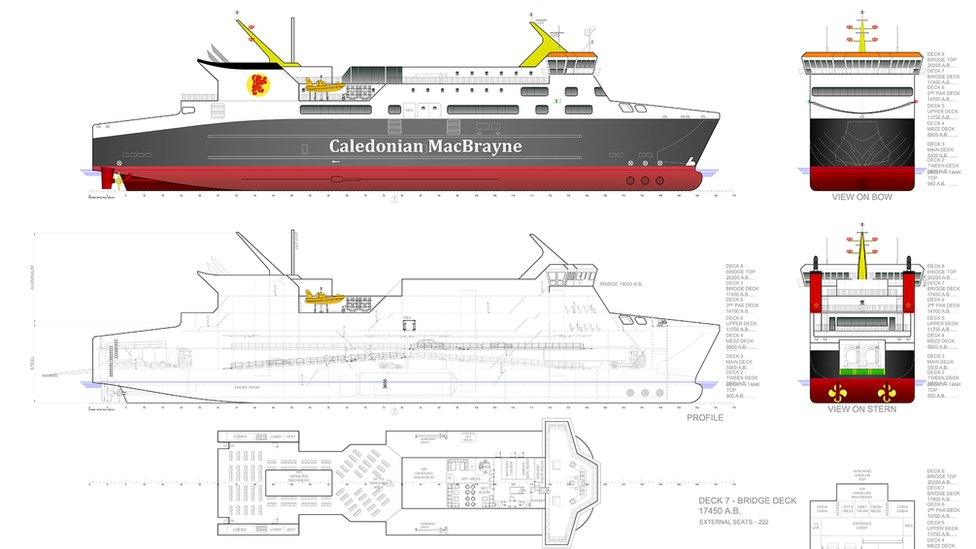
Ferguson was allowed to resubmit drawings for a much lighter ship
Model 10 is only briefly mentioned in the original submission and does not appear to be presented as an alternative design.
FMEL was asked for more details on Model 10 in May after a naval architect, who reviewed the bids for CMAL, observed that Model 20 was heavy and overpowered.
Barry Smith says he did not see FMEL's response to CMAL's request for more information on Model 10. The BBC has a copy and it contains some crucial information.
It shows how the switch to Model 10, because it was lighter and required fewer materials, allowed FMEL to significantly reduce its price proposal from £109.8m to £100.5m (it would later be reduced again to £97m).
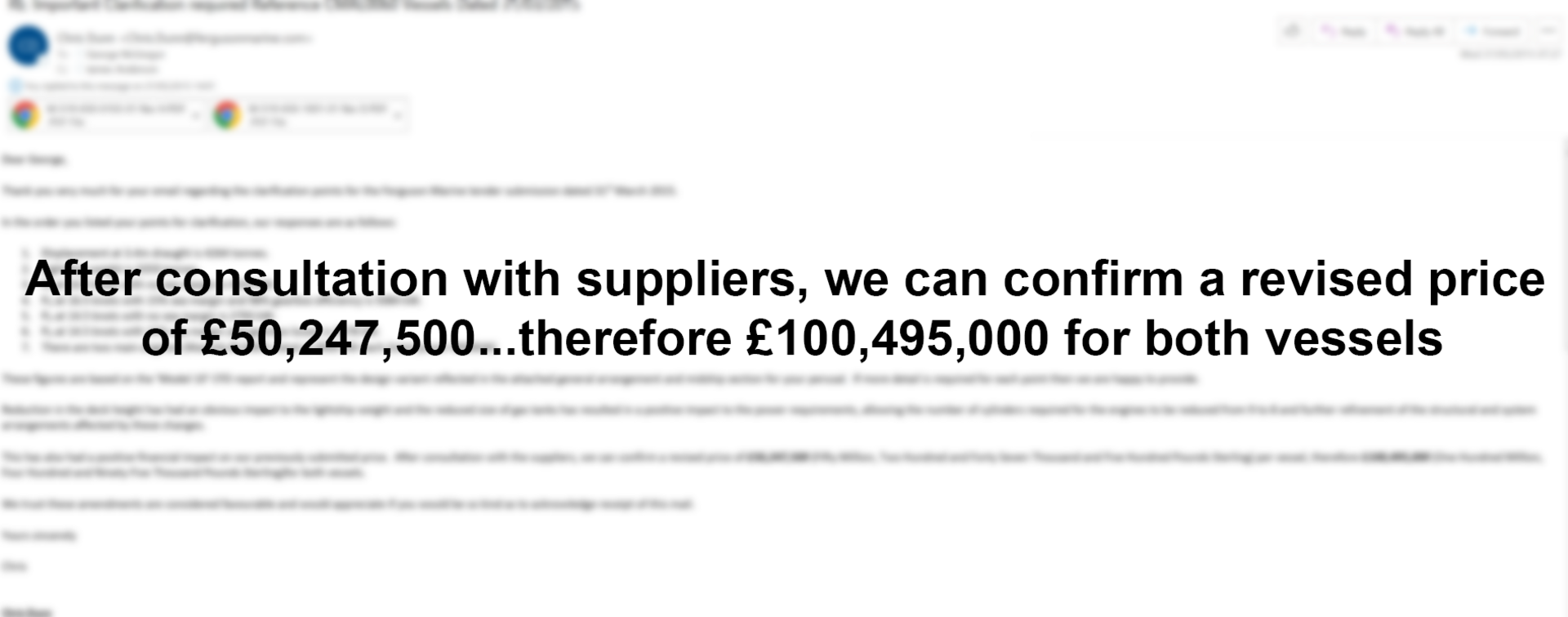
CMAL then scored FMEL on this revised design.
The BBC has calculated that this reduction in price, submitted nearly eight weeks after the deadline for bid submissions, gained FMEL an extra 5.8 points in the overall assessment.
At point of award, the difference between FMEL and the second-placed design (Remontowa LMG) was 2.9 points.

HOW HAS KC BARRY SMITH RESPONDED?
The BBC asked Barry Smith about all the points listed above.
He responded: "I set out in my report the terms of reference I was given; and the methodology I followed in carrying out a thorough and independent investigation.
"I have clearly explained the basis of my findings and conclusions, including under reference to the documents I was provided with, or ingathered during the investigation.
"My investigation was instructed by CMAL pursuant to their duties under the SPFM [Scottish Public Service Manual] to investigate allegations of fraud. If the BBC believe there is new information that I have not seen, then please share all relevant information with me and I will carefully consider it."

HOW HAS CMAL RESPONDED?
CMAL said in a statement: "We are not aware of any concerns raised by George McGregor to any member of the CMAL team in relation to the procurement process of 801 and 802 [Glen Sannox and Glen Rosa]
"We can confirm that all relevant information in our possession was provided to Barry Smith KC during his investigation."
Reporting team: Mark Daly, Calum Watson, Kevin Anderson
Related topics
- Published3 November 2023
